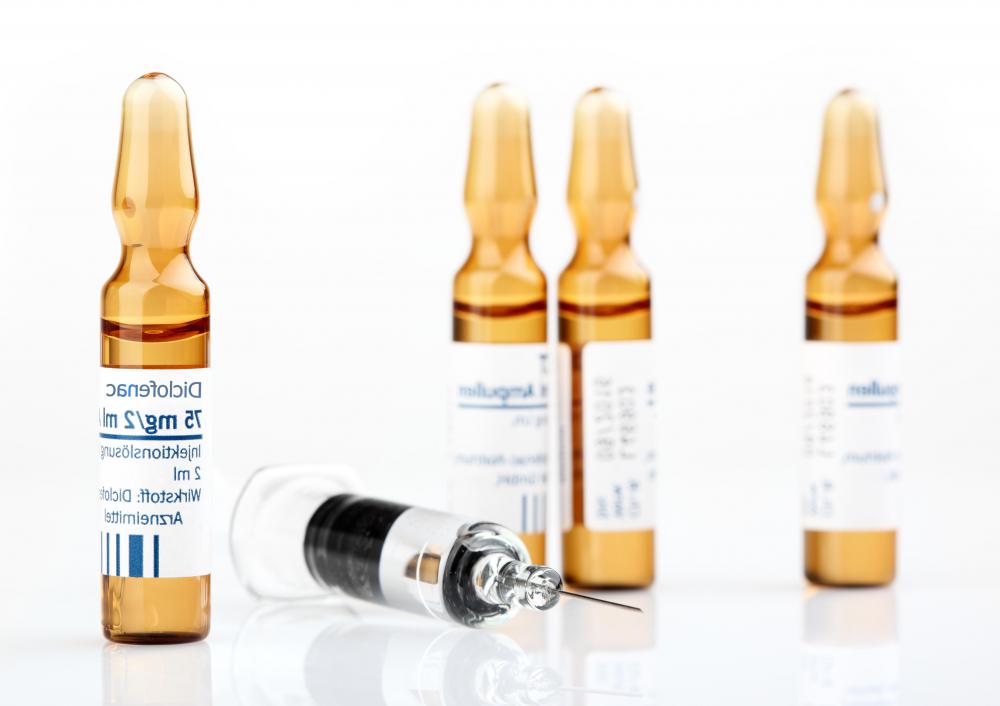At WiseGEEK, we're committed to delivering accurate, trustworthy information. Our expert-authored content is rigorously fact-checked and sourced from credible authorities. Discover how we uphold the highest standards in providing you with reliable knowledge.
What Is Diclofenac Cream?
Diclofenac cream is a non-steroid, anti-inflammatory drug (NSAID) used to treat osteoarthritis and actinic keratosis. This cream reduces inflammation by inhibiting the enzyme cyclooxygenase, a key component in the production of prostaglandin, which causes inflammation. Side effects of diclofenac are heart attack, stroke, or damage to the stomach lining. Diclofenac cream rarely has any side effects due to its low concentration and lack of or reduced penetration into the blood stream.
The use of diclofenac depends on the concentration. A 1% concentration is typically used to decrease osteoarthritis joint pain in the feet, ankles, knees, elbows, wrists, and hands, but may not be adequate to control pain in other areas. A 3% concentration is used to treat actinic keratosis, skin lesions resulting from excessive sun exposure or repeated sun burns.

Diclofenac cream prevents inflammation by inhibiting the enzyme cyclooxygenase, an integral component in the production of prostaglandins, which are responsible for modulating the inflammatory response in tissue. Preventing the production of prostaglandins reduces the amount of tissue inflammation. It is not exactly known how diclofenac cream heals actinic keratosis, but elevated prostaglandins have been associated with actinic keratosis and sun burn. The prostaglandin-suppressing action of the cream may improve healing of the skin.

The side effects of diclofenac cream are rare because it is localized in its action and does not often penetrate the blood stream in large concentrations. Most doctors recommend that their patients be familiar with the side effects in case they are sensitive to the drug, the cream is abused, or used for a prolonged period. The most serious side effects of diclofenac are heart attacks or stroke. Patients should seek immediate medical help if they experience chest pain, difficulty breathing, disorientation, or dizziness. In addition, diclofenac and other prostaglandin-inhibiting drugs can weaken the stomach lining, causing tears in the stomach and producing symptoms such as black, bloody, or thick tar-like stool as well as vomit that looks like coffee grounds.

When first used, the cream should only be applied to one area, and the site of application should be observed for a short time for any signs of an allergic reaction, such as red, itchy skin. If an allergic reaction is observed, use of the cream should be stopped. The cream can make the skin sensitive to the sun, so prolonged direct exposure to the sun should be avoided following application. This cream is also not recommended for pregnant or nursing women.
AS FEATURED ON:
AS FEATURED ON:















Discussion Comments
My doctor recently put me on Diclofenac for one particularly painful arthritic location/ old injury spot in my upper neck, just below my skull, and it's the Only thing that's Ever helped! At 77, this is the only thing that has given me any relief since the accident some 50 years ago! Thanks, Dicliofenac and my docs !
My aunt used this cream for actinic keratosis. She had these dark patches on her face from sun-tanning too much. The doctor gave her this cream and told her to stay out of the sun. The patches disappeared in two weeks.
@ddljohn-- I took diclofenac for a short while when I was diagnosed with a lumbar herniated disc. I was in a lot of pain and diclofenac made things manageable for me. I didn't have any side effects and I used it for about a week. If you don't take these types of drugs on a regular basis, I don't think you will have any problems.
The one side effect my doctor had warned me about was stomach problems but I didn't experience that either. And I think the cream is better than the tablets because the tablets are absorbed through the gastrointestinal system and cause upset stomach. But even people with sensitive stomachs can take this for a short while if they also take a proton pump inhibitor to protect their stomach.
I don't think you have anything to worry about. Just use it when the pain is bad, don't overdo it and don't use it regularly.
I have never heard of heart attack and stroke being mentioned as a potential side effect with anti-inflammatory topical medications before. What is it about diclofenac gel that creates this risk?
I'm using a different anti-inflammatory cream right now but my doctor mentioned diclofenac cream at my last visit and said that I could switch to this if my inflammation doesn't reduce. But I don't think I want to use this cream if there are such serious side effects involved.
Post your comments